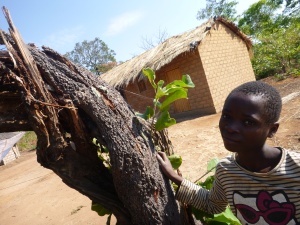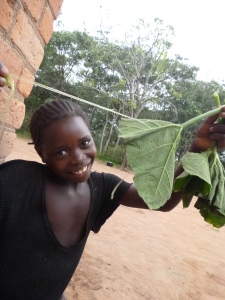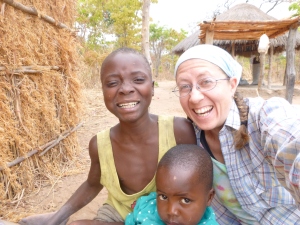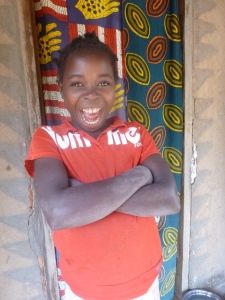12 April 2015
My family is shrinking by the day. Two of my Mfuba siblings have now gone to live elsewhere – and this time I didn’t even get to say good-bye.
At dinner with the Mutales last night, 10-year-old Joyci was absent. It’s common for kids to eat with grandparents, aunts, uncles, or older siblings rather than with their parents, and Joyci in particular likes to wander. I assumed she was just eating elsewhere.
But when I enquired about her whereabouts, Ba Agatha told me Joyci had gone this morning to Kabila, 60 kilometers of rutted dirt road away, to stay with relatives for a while.
This is common. During my time in Mfuba, three kids I know well have just disappeared one day, only to return months later – or never. Sometimes their parents don’t even know they’ve left until they’re already gone. Two different kids have showed up in Mfuba, seemingly out of nowhere, stayed for several months, then gone back to wherever it was they came from.
No one seems to miss them terribly. I’m told that staying with distant relatives is exactly the same as staying with your parents.
The same word – bamunyina – applies to both siblings and cousins (even second or third cousins). Your aunt is also your mother; your uncle is the same as your father. If your father or mother dies and another family takes you in, you will automatically call the man of the house your father, and the woman your mother.
Just as Bembas share and change homes, they share and exchange children with the flexibility of one giant, extended family.
My little brother, 15-year-old Stephen, came to live with the Mutales more than three years ago, when his father died and his mother couldn’t take care of all their children. Stephen adopted a new last name and began calling Agatha and Bernardi “mom” and “dad.”

Steven, aka Bwalya, posing with a lizard you can JUST make out in the twisted trunk of the tree at left.
Then about six months ago he and Agatha had a falling-out. She accused him of eating extra groundnuts that she was trying to save, and of not doing enough work around the house. He told me he felt Agatha had never wanted him there. So Stephen stomped out and went to live with another family less than a kilometer away.
Even this small move had a huge impact on my day-to-day life. Stephen used to be at my house every day, whether to study English, help me with some yard project, or just to return some pot or dish I’d left at the Mutales. Strange to say about a teenage boy, but he was my best friend in Mfuba.
These days Stephen walks to school by a different path, hangs out with a different group of kids, and rarely comes by just to hang out. His life is irrevocably different. And so is mine.
Now Joyci is gone, too.
I love that girl like crazy. Her outrageous stories; her all-out, arm-flailing dancing; even her ridiculous temper tantrums. Every time I returned to Mfuba after an absence of a couple weeks – or even just a few days – Joyci was the first one to come running, throwing her arms around me and declaring, “I missed you so much!”
So it was with some trepidation that I asked Ba Agatha: “When’s she coming back?”
“When school starts again.”
That’s May 11. I leave Mfuba for good on April 20.
I burst into tears.
I’ve been emotional enough lately over my impending departure from Mfuba. But this is different. With only one week left, I simply don’t have time to visit Joyci so far away. I don’t even know how to get to Kabila.
How can I leave without saying good-bye to my little sister? Without giving her one last hug?
The reality is, this is probably a lot harder on me than it is on Joyci. Maybe she’s used to this sort of thing and doesn’t think much of it.
This is what I’m trying to tell myself, even though I’m crying again just writing this.
That, and one other thing: the night before Joyci left, she and I danced together in the Mutales’ nsaka. Just the two of us, flailing our arms and legs, twirling each other around, and laughing like crazy.
So instead of a tearful good-bye, I get to remember Joyci like this, in all her outrageous glory.
And maybe that’s exactly as it should be.




































